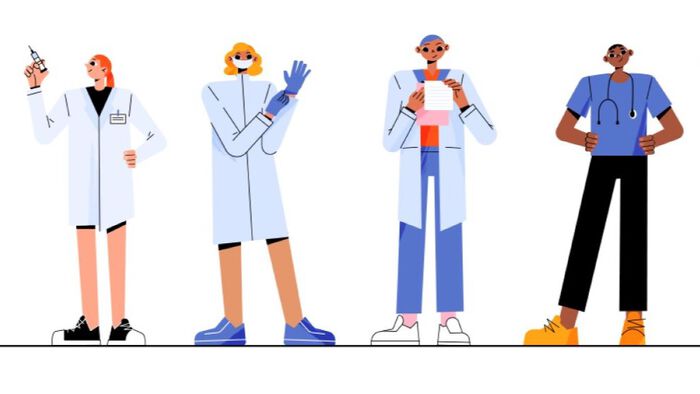In 2022, unlike many other parts of the world, Sierra Leoneans overwhelmingly gave their government high marks in handling the COVID-19 crisis, with 9 in 10 (91%) saying that the government handled the outbreak “well” or “very well.” A strong majority (80%) also said that the country’s experience with Ebola prepared it to handle Covid-19 (Afrobarometer 2023).
These positive valuations could seem surprising given that Sierra Leone’s health care is marked more by fragmentation than synergy according to a recent Lancet Commission. Established in 2018, the Commission explored the drivers of synergies and fragmentation between the three global health agendas of Universal Health Care (UHC), Health Security (HS), and Health Promotion (HP) across more than twenty countries, including Sierra Leone. Its goal was to advance recommendations that promote synergies among these three agendas, at the global and country levels, minimize fragmentation, and ultimately result in improved health outcomes (Lancet 2023; Lancet 2018). The Commission defines synergy as an “intervention, institutional capacity, or policy, that positively and substantially contributes to the achievement of two or more of these agendas” (Agyepong et al. 2023, 1964).
Yet in an article drawing on the research conducted for the Commission, we found that in Sierra Leone, similar to many other countries, competing agendas on the part of donors and government, among other factors, often lead to fragmentation rather than synergy (see for example, Agyepong et al. 2021; Rudasingwa et al. 2022; Sarker et al. 2022). This notwithstanding the dominant call, and ostensible international and national commitment, post Ebola, to health systems strengthening (World Bank, 2018).
Fragmentation is partly grounded in domestic factors, partly global. International agendas and priorities mediated by local contexts, influence health interventions in ways that offer both opportunities for synergy and fragmentation. Even before the COVID pandemic, it was clear that the rhetoric on implementing universal health care post-Ebola had not been matched by external and internal financial support, as well as political commitment. Rather, international dictates, and priorities, still dominated, despite lip service paid to the importance of increasing local agency and decolonising aid (Shamasunder et al. 2020).
For example, following the Ebola pandemic, concerns over inter-country transmission meant that detection and containment was prioritized resulting in interventions that focused largely on health security albeit with little funding allocated to operationalizing the new policies and plans (Government of Sierra Leone 2017).
Many Sierra Leoneans complain that donors have greater power to dictate the terms of the agenda and to establish country priorities as they provide the bulk of health care funding (Agyepong et al. 2021), and aid in Sierra Leone has been characterised as “project-oriented and fragmented” (Denney, Mallet, and Jalloh, 2015: 9). The vertical nature of aid, with a focus on pet projects and diseases of interest to donors (Bertone et al. 2018; Save the Children, 2015; Eurodad and Campaign for Good Governance,2008) has contributed to enduring health sector weaknesses including limited human resources for health, poor hospital infrastructure, salary payment delays, and medical supply and drug shortages, among other issues (Barr et al. 2019).
Yet, local factors can also promote fragmentation and undermine synergies, with fragmentation understood as an outcome of agency: the result of deliberate actions on the part of actors, using power and processes in ways that undermine synergy. Political machinations, the lack of institutional memory due to politically motivated appointments and reshuffles, and a change of regime, among other issues, have led some interlocutors to suggest that fragmentation is a deliberate policy that benefits a privileged few (M’Cormack-Hale, Hale, and Lavali 2018).
At the same time, Sierra Leone shows that fragmentation is not always bad; it can provide opportunities as well as constraints for improving health care in a context where there are multiple sites of power and competing players, across all levels. This includes experimentation and adaptation as lessons are learned about what works and what doesn't. For example, in the COVID response, the government moved away from more formalised institutional structures for containment, and instead, made increased use of community care centres, similar to those operating during Ebola (Meriggi and Mobarak 2020) , and allowed those who could, to self-isolate. They also made efforts to intensify social mobilisation at the community level, leveraging traditional, women, and religious leaders more (Meriggi and Mobarak 2020) and tried to decentralise in practice, with District Ebola Response Centres being rolled out in all districts. In some ways, then, the Sierra Leone State resisted simply implementing global-level interventions and instead, prioritised the local context, one approach that the Commission advocates as key to promoting synergies.
Sierra Leone’s COVID response tells us promoting synergies between the agendas of universal health care, health promotion, and health security requires a fundamental reorientation of how the international community thinks about the global health agenda. Notwithstanding innovative policies that a country might have, adequate funding to implement these policies is integral. Capacity gaps, both financial and technical also have to be addressed. International commitments must not simply focus on health threats, but should also be committed to justice principles, and equity (Shamasunder et al. 2020). There needs to be a focus in practice and not just in theory, of resources and investments that contribute to the advancement of universal health care in tandem with health security and health promotion. A broader conceptualisation of healthcare funding can more effectively address current and future epidemics and pandemics (Shamasunder et al. 2020). Thus, while Sierra Leoneans gave top marks for the country’s handling of the COVID-19 response, the country still lacked the finances and resources to adequately mount a response that would have addressed the outbreak successfully, should it have proved to be more deadly than it was (Amara et al. 2021).
At the same time, Sierra Leone reinforces the Commission’s findings on the importance of local leadership, which some had criticised as top-down, overly militarised, and political, with women excluded in top positions, during the outbreak (Amara et al. 2021). Sierra Leone’s current Minister of Health, Dr. Austin Demby has prioritised universal health coverage and health systems strengthening in the country’s latest National Health Sector Strategic Plan (2021-2025); and called specifically for reducing fragmentation and boosting synergies across all three health priority agendas. To attain this, he has committed to, among other things, progressively increasing domestic investments in health to 15% GDP, incentivising health care performance across all levels, and ensuring donor alignment to government priorities (National Health Sector Strategic Plan (2021-2025). It would appear that this approach is yielding some success - according to the most recent Medium Term National Development Plan 2023-2030, maternal mortality dropped from 717 deaths (2019) to 443 deaths per 100,000 live births at time of writing. Only time will tell if these changes are sustainable.





